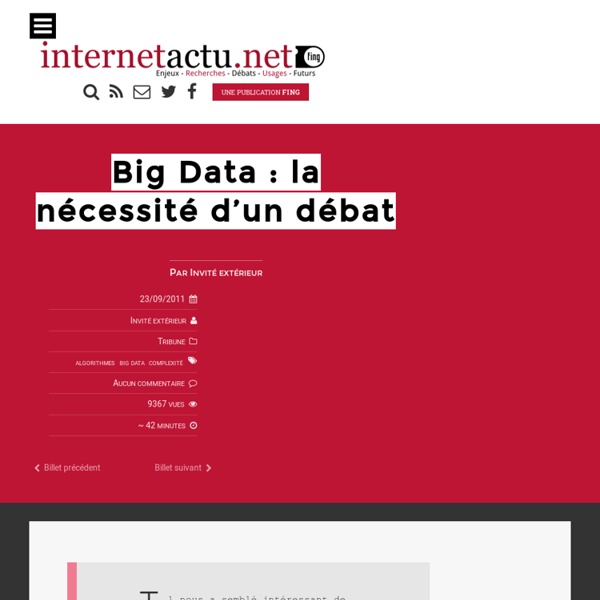



http://www.internetactu.net/2011/09/23/big-data-la-necessite-d%e2%80%99un-debat/
Splash.FM, a Klout for music discovery, opens up beta New York-based social music startup Splash.fm opened up its site to the public Tuesday, allowing anyone to sign up and discover new tunes. The site allows users follow friends and tastemakers in a Twitter-like fashion, share songs with their own network and “splash” the song recommendations of others to show their approval. Users who “splash” a lot of songs and whose recommendations get reshared by others will over time accumulate a high “Splash Score,” which is something like a Klout score for your music curation skills. THE COUNTRY'S PROBLEM IN A NUTSHELL: Apple's Huge New Data Center In North Carolina Created Only 50 Jobs Apple Yes, it's huge. But only 50 people work there. Optimists argue that the solution to the US's sky-high unemployment and income inequality is more companies like Apple--the resurgent tech company that has revolutionized the digital industry and become one of the most valuable companies in the world. Apple has not not only created amazing, beloved products.
Do recommendation systems make the ‘tail’ longer or shorter? Earlier this month, Netflix (an American provider of on-demand Internet streaming media) offered some details about the working of its recommendation system. It is explained that recommendations are provided through various channels (“Top 10” lists, different genres appearing on the front page, ordering of movies) that are combined in a dynamic way. And apparently, the whole system is quite efficient: “The company says that its customers are so confident in the system at this point that 75 percent of all movies watched by members come from recommendations.” Two weeks later, Splash.FM (a NewYork-based social music startup) announced its intention to push recommendations several steps further.
Big Data’s Impact in the World Mo Zhou was snapped up by I.B.M. last summer, as a freshly minted Yale M.B.A., to join the technology company’s fast-growing ranks of data consultants. They help businesses make sense of an explosion of data — Web traffic and social network comments, as well as software and sensors that monitor shipments, suppliers and customers — to guide decisions, trim costs and lift sales. “I’ve always had a love of numbers,” says Ms. Zhou, whose job as a data analyst suits her skills. Google Knowledge Graph Could Change Search Forever Google has a confession to make: It does not understand you. If you ask it “the 10 deepest lakes in the U.S,” it will give you a very good result based on the keywords in the phrase and sites with significant authority on those words and even word groupings, but Google Fellow and SVP Amit Singhal says Google doesn’t understand the question. “We cross our fingers and hope someone on the web has written about these things or topics.” The future of Google Search, though, could be a very different story. In an extensive conversation, Singhal, who has been in the search field for 20 years, outlined a developing vision for search that takes it beyond mere words and into the world of entities, attributes and the relationship between those entities.
The evolution of data products In “What is Data Science?,” I started to talk about the nature of data products. Since then, we’ve seen a lot of exciting new products, most of which involve data analysis to an extent that we couldn’t have imagined a few years ago. The Attention Economy: An Overview Written by Alex Iskold and edited by Richard MacManus It is no secret that we live in an information overload age. The explosion of new types of information online is a double-edged sword. We both enjoy and drown in news, blogs, podcasts, photos, videos and cool MySpace pages. Six Provocations for Big Data by Danah Boyd, Kate Crawford The era of Big Data has begun. Computer scientists, physicists, economists, mathematicians, political scientists, bio-informaticists, sociologists, and many others are clamoring for access to the massive quantities of information produced by and about people, things, and their interactions. Diverse groups argue about the potential benefits and costs of analyzing information from Twitter, Google, Verizon, 23andMe, Facebook, Wikipedia, and every space where large groups of people leave digital traces and deposit data. Significant questions emerge.
The attention economy explained by David Gauntlett Basic Web Economics:How things work in the 'attention economy' This page explains how people make money from giving away information free over the Web, and how the internet has (arguably) brought about a whole new economy -- the 'attention economy' -- where traditional wealth becomes less important than the ability to capture people's attention. But let's start at the beginning... I hear that the people who invented the web directory Yahoo! are millionaires. But how does anyone become a millionaire by making a website which doesn't sell anything and which gives away information for free?